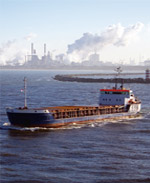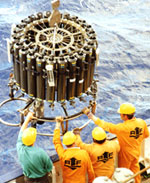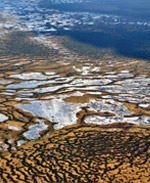- How climate change alters ocean chemistry
- > Massive emissions of carbon dioxide into the atmosphere have an impact on the chemical and biological processes in the ocean. The warming of ocean water could lead to a destabilization of solid methane deposits on the sea floor. Because of the excess CO2, the oceans are becoming more acidic. Scientists are making extensive measurements to determine how much of the humanmade CO2 is being absorbed by the oceans. Important clues are provided by looking at oxygen.

Material fluxes – getting the full picture
The chemical and geochemical processes in the ocean are complex. Explaining them in their entirety will be a challenge for decades. There is clear evidence of global changes, such as the decrease in oxygen levels and acidification in the oceans. So far, however, our knowledge is not sufficient to say with certainty or in detail what impact climate change will have and how it will affect various parameters in the future. It is certain that disturbances caused by climate change can have very serious consequences, because the chemical and geochemical material fluxes amount to many billions of tons. The amount of methane hydrate bound up in the sea floor alone is gigantic. If it is released and the methane rises into the atmosphere, it will have a significant impact on the development of future climate. Investigations of the chemical and geochemical processes are therefore of enormous importance if we want to learn what to expect and how humanity can respond to it. Analyses of the CO2 cycle reveal how the CO2 reservoirs of the atmosphere, land biomass and ocean interact. The oceans are buffering increasing concentrations of atmospheric trace gases. But these processes and reaching a new CO2 equilibrium will take millennia. Natural processes therefore cannot keep up with the speed at which humans continue to discharge CO2 and other climate-relevant trace gases into the air. The only solution is to save energy and significantly reduce greenhouse gas emissions.



